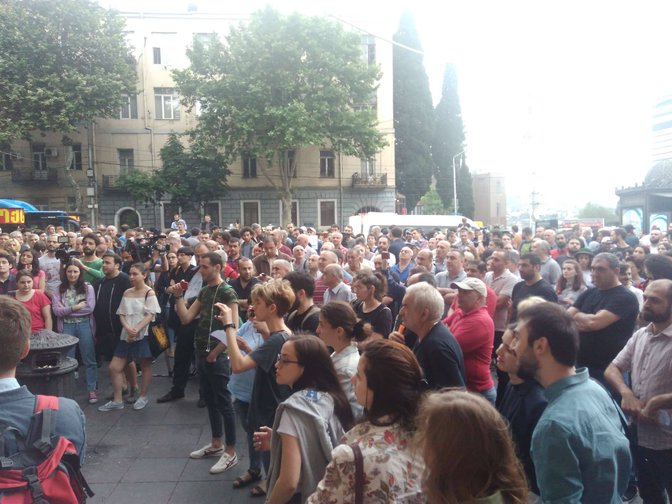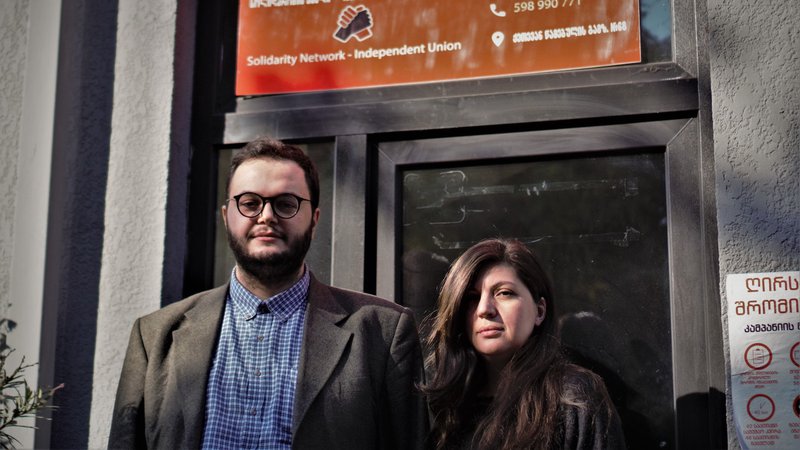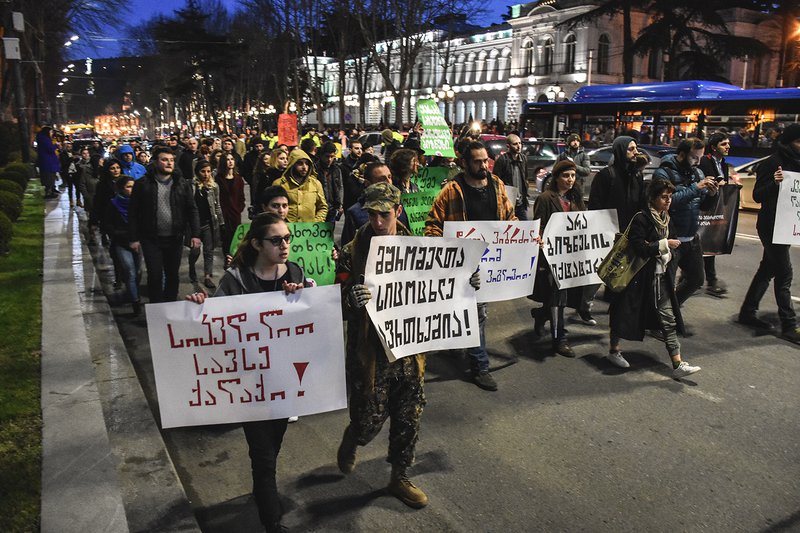
LeftEast publishes Volodya Vagner’s interview with Georgian unionists in collaboration with OpenDemocracy-Russia.
Georgia has recently seen a wave of strikes by newly established unions. In summer 2018, the Ertoba2013 union, which organises Tbilisi’s metro workers, shut down the Georgian capital for several days, before the city municipality eventually met its demands. Earlier this year, a new social workers union staged a successful strike for wage increases and better working conditions.
Both unions are allies of the Solidarity Network, an activist union and workers centre started by retail and service sector workers in 2015. Together with the metro workers, social workers and a union of media workers, the Solidarity Network has recently launched a new, nationwide trade union confederation, challenging the position of the Georgian Confederation of Trade Unions (GTUC).
The Solidarity Network does not currently have any paid staff, and is run by volunteers. Two of the group’s founders, Sopio Japaridze and Revaz Karanadze, spoke to openDemocracy about the challenges and possibilities of radical labour organising in today’s Georgia.
Looking at the history of Georgia, the two political projects with the clearest ideological legacies seem to be the Soviet era and then, more recently, Mikheil Saakashvili’s neoliberal reform program.
How do those legacies affect the context in which you work? Is the Georgian situation more comparable to the one in Western Europe or to other post-Soviet contexts?
Revaz: The problem is how we define the post-Soviet legacy. The dominant liberal paradigm talks about “Soviet mentality”, which I find really unscientific, and says “the Soviet Union took away all our rights”, without considering the positive rights that were ensured.
So we had this hysterical push for de-Sovietisation, which brought in narratives of neoliberalism, and neoliberal NGOs running the agenda. Neoliberalism has thus come to be the post-socialist legacy, as you see in the turn from socialist planned economies, especially in the late 1990s to early 2000s, to hawkish neoconservatism and neoliberalism, across Eastern Europe.

Sopio: But compared to other Eastern European countries, it’s even worse here. In contrast to Poland, for example, where you had the Solidarność union, unions played no role in Georgia’s transition. Our dissident movement and opposition here consisted mainly of the church and cultural figures. Workers were not represented, and I think that’s really shaped subsequent developments.
Revaz: If we go back to the idea of the Soviet legacy, the Georgian Trade Union Confederation, GTUC, is one structure we basically inherited from the Soviet era.
Sopio: But GTUC are not an organising union. They mostly consist of older folks who are paying their dues for the past 30 years, probably not even aware they’re part of a union, or what a union is, getting things like travel vouchers in return.
So, that’s a Soviet structure that’s still in place, but you see it as a hindrance more than anything. Did the Saakashvili era have any positive effects then, in terms of breaking that up?
Sopio: Not as far as unions. Here it was detrimental in that there is no longer any way to win in the court system. The GTUC was reformed in 2006 or 2007, to turn them into more of a Western style union. As a lip service, to pretend that there were real unions and democracy. But that’s bullshit. They’re the same garbage, but now pretending to be pro-Western. I think it’s actually quite similar to other post-socialist countries, like Russia, where the unions will be loyal to Putin, except here they’re pro-Western
There are some young people who are being mobilised around Russia issues, but most workers don’t care about that as much as they care about poverty or inequality
Generally speaking, workers lost so much in Georgia, so quickly, that today they can no longer imagine winning it back. They were crushed mentally. They feel even less powerful now than they did before, when they already felt quite demoralised.
Does the tense Georgian-Russian relationship affect your day-to-day work, in the sense of leftist ideas being associated with the Soviet Union, and by extension with Russia?
Do you run the risk of being called a Russian agent if you talk about things that might have Soviet connotations, like labor issues, workers rights or union power?
Sopio: Well, I’m an American citizen so it’s really hard to pin Russia on me. But it’s not that big of an issue. Some libertarians have called us Russian agents, saying that socialism was a Russian ideology, sent to infiltrate Georgia and make it poor.
Revaz: Yes, if anything it’s these hardcore deregulation figures, politicians or parts of the right-wing media that try to put these labels on us. We just stick to the issues, emphasising that what we want is decent working conditions and decent wages.
In my experience, the single mom who has to work three jobs doesn’t care about the labels. Generally, rather than us being called pro-Russian, the issue with the geopolitical stuff is that it dominates headlines all the time, no matter what’s happening. Someone might have died at their workplace, but still the mainstream media will focus on geopolitics. On the other hand, I always thought the media had a huge effect on the people. But the social conditions in this country are so dire right now, that the media doesn’t have that strong a hold on the people, anyway.
Sure, there are some young people who are being mobilised around these Russia issues, but most workers don’t care about that as much as they care about poverty or inequality. I think this hold is broken, despite the fact that all the money and visibility, all the material resources, are in the hands of the very anti-socially oriented NGOs, business associations, chambers of commerce, and right-wing parties.
What are the attitudes toward unions today, are they being seen more positively?
Sopio: Unions actually have some of the lowest trust ratings of all public institutions, behind the church, and the police, and so on.
Revaz: But as we already discussed, most people don’t really know what unions are.
Sopio: Yes, many don’t really know what unions are for, and just hate the leadership figures. But I think the stuff we’re doing, like petitioning, collecting signatures for our minimum wage campaign in front of metro stations, that’s exciting for people to see.
Revaz: I think when people saw how the social workers were successful in their protests and what the metro union achieved, some started seeing that maybe trade unions aren’t just there to provide free time activities or services. That trade unions are not about services, but about engagement and organising. And I think this notion is slowly being built. But to what extent things have changed, I couldn’t say right now.
Sopio: We have a politically holistic approach. Like when it comes to the issues of social workers, we try to push how it’s also taxation issue and a result of Saakashvili’s neoliberal approach of limited government and dismantling of the welfare state. We try to connect the dots.
During the metro workers’ strike, I feel we were very successful in getting people on our side because we emphasised the horrible working conditions, the lack of health and safety, and larger issues, like public transit constantly being degraded.
Revaz: I think having made labour issues mainstream in the media and in social media, when it used to just be a subcultural topic for leftists, has been a success of ours.

In many struggles, and especially within political unions, you often have a gap between dedicated activists, who are in it for the politics, and those members whose involvement is motivated by some concrete personal interests. Do you have this gap, and if so, how do you handle it?
Revaz: Well, there is a gap, I would say, between those with strong workers consciousness, like the metro workers union, and those individual people, especially from the service sector, who came wanting help with their individual problems.
But we try to make clear that we are not a legal company, not a service-based union. We try not to focus so much on individual cases anymore. We try to politicise and agitate as much as we can, to raise workers consciousness to help them organise their thoughts in a way that’s politically beneficial for all of us. And some of them are now themselves politicising others. It’s like chain organising.
Sopio: When it comes to activist kids, I actually don’t think that they are more politically minded than the workers. A lot of the kids who used to be in our organisation as activists ended up leaving.
So the ones that remain are those that are involved through their place of work?
Sopio: Yeah, and those are the best people, the ones to count on. They’re the ones who really care. That’s why unions should be by the rank and file, not 20-year-old activists. Ours was a stupid model actually.
What do you mean?
Sopio: I mean the Solidarity Network. Initially it was heavily reliant on kids, to get it going.
But you’re overcoming that now?
Sopio: We haven’t overcome it, but we are trying to get more workers into leadership positions, which is very difficult, especially with our people being so precarious. I love the fact that when we go petitioning, it’s nurses and other workers that come, rather than students. That, I think, is already a positive step.
So it’s members of the other three unions that you’ve allied with, the social workers, the metro workers and the media workers, who participate?
Sopio: Yeah.
Does that mean you’ve established good working routines with those allied unions since uniting in your joint confederation in the spring?
Sopio: We’re still in the process of merging, and things will take some time to routinise. The metro workers and us work really well together and have developed a routine. Collaboration with the media workers and social workers is still harder, since we don’t know each other as well yet.
How I can tell someone to stay here, where everything is working against you? Unless you have a transformative movement that can really change society. People have to believe in a larger transformation of society, and many people just don’t. I don’t know anyone who doesn’t have a plan to leave
We don’t always know the outcome beforehand. But GTUC has never won anything more than a 10% increase of wages. We’ve won 30%. There is a better outcome with militancy, we win more.
The Seattle Solidarity Network, which inspired your organisation, beside labour organising, also engages in other social struggles, like around tenants’ issues. Does the scope of your work also extend beyond labour struggles?
Sopio: Well, we tried to work with tenants’ issues too, but it was tricky, because few people in Georgia rent their apartments. Instead, we worked with a group of people who were defrauded by a development company, and lost their investment.
Revaz: But that wasn’t really practical, we couldn’t really infiltrate the issue on a political level. A different example would be women’s rights. We are based on Marxist feminist principles, and we organised this big 8 March rally [for International Women’s Day].
Your comrades in the metro workers union are mostly male, while the social workers union you’re allied with is mostly female. How does the feminist dimension play into your relationship with those respective allies?
Sopio: Well the social workers came and spoke at the 8 March event. They’ve also taken a stance on LGBT issues, which the metro workers wouldn’t get anywhere near. But the metro workers came to the 8 March event too. It was really funny: One of them didn’t come, because as an older man he felt embarrassed to be among all these young women. That hHe was worried he’d look like a creepy dude. He was trying to go with his niece, but she got sick. He still feels bad about not showing up.
To what extent do those feminist principles inform your work, beyond the 8 March mobilisation?
Sopio: Our minimum wage campaign is one example. The fact that minimum wage is so low in Georgia primarily affects women. We also campaign for paid maternity leave.
Are you seeing other areas of social struggle that you might get more involved with?
Revaz: Well we’re definitely going to get there. Environmental issues are very important for us, for example. But at this stage of capacity building, it’s not really plausible for us to try and organise a cohesive campaign around other issues.
In recent years, some unions and political movements in Britain and elsewhere have shifted focus to organise more around notions of precariousness, and attempting to mobilise “the precariat”. Is that a useful concept for you?
Sopio: There isn’t really any organic word for the notion of precarity in the Georgian language. But we speak a lot about the lack of social security that comes with the push for flexibility. In a way, everyone in Georgia is precarious.
Both of you have lived abroad and returned. How does migration affect you organising? Do you have issues with people leaving the movement to move abroad?
Sopio: I think it’s our number one issue. People learn valuable skills through their involvement in our organisation, and then leave to try and get a formal education or a better job abroad. Closed borders would actually be the most helpful thing for us right now [laughs].
Revaz: As of 2007, Georgians can enter the Schengen area for three months without a visa. Since then everyone has had their eyes on Europe to run, run, run, run. At least to try and get a degree. And if they come back, they won’t come back to us, because they’ve moved up socially.
Sopio: It’s like in the US in the 1930s, when the labour movement was at its strongest. One of the biggest factors working against the unions was the cheap land out west, attracting people to settle there. That migration kept emptying the ranks of good leaders.
Now it’s like that here in Georgia, except with the hopes of the European dream. I don’t know how we can compete with that. Objectively, how I can tell someone to stay here, where everything is working against you? Unless you have a transformative movement that can really change society. People have to believe in a larger transformation of society, and many people just don’t. I don’t know anyone who doesn’t have a plan to leave.
So, migration is the biggest challenge of all?
Sopio: Absolutely, so many people are so disenfranchised. It’s like a societal burnout which comes with the lack of hope. People feel like all our problems have existed for so long, they don’t think anybody will be able to solve them.
So, it’s easier to struggle in Europe, where your suffering will at least get you closer to a better life for yourself. But here you just suffer, with no deeper meaning.
Revaz: I try to stay positive and think that there might be some kind of breaking point. But you need to use the breaking point. You need to really work hard on it.
Sopio: It’s like the Gramscian thing, the optimism of the will and the pessimism of the intellect. We know everything is against us and there is very little chance to change that. But we believe in intervention and I do think we have a chance and should use it. That’s why we’re doing everything we’r
Volodya Vagner is a Sweden-based freelance journalist with an interest in labor, social movements, human rights and radical politics, especially in post-socialist Eurasia.

